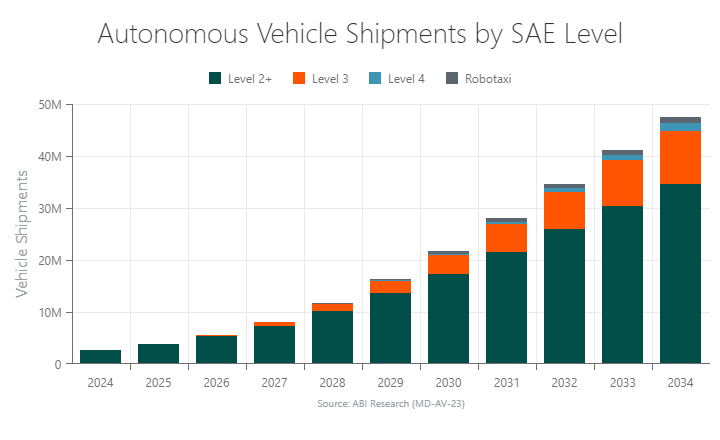After years of prototyping and concept exploration, autonomous vehicle applications are closer to being ready for the real world on a global scale. While car manufacturers have historically juggled multiple partners simultaneously, this approach has proven unfeasible for the shift to deploying self-driving cars. As you will read in this blog post, the top autonomous vehicle companies are consolidating their driverless applications to create value in an ever-growing market.
In ABI Research’s competitive ranking of autonomous vehicle platforms, our analysts studied eight of the best companies providing platforms for automotive industry players with autonomous driving aspirations. For this post, I’ll walk you through the top five of those companies and explain which technological areas each platform provider excels in.
Short on time? Watch the YouTube video below for a brief version detailing the market leaders in the autonomous driving space.
Table 1: Autonomous Vehicle Company Features and Partnerships
| Company | HQ | Key Features | Notable Partnerships |
| Mobileye | Jerusalem, Israel |
|
|
| NVIDIA | Santa Clara, California |
|
|
| Qualcomm | San Diego, California |
|
|
| Valeo | Paris, France |
|
|
| Waymo | Mountain View, California |
|
|
Autonomous Vehicle Market 2024 Update
In the autonomous driving market, Level 2+ systems will stay dominant, even as Mercedes-Benz and BMW launch their first Level 3 systems. Level 2+ is more affordable for carmakers because it doesn't require costly sensors like LiDAR or extra computing power due to its supervised operation. By 2030, Level 2+ vehicles will make up 15.8% of global vehicle sales, more than four times the number of vehicles with unsupervised driving.
Looking ahead, the success of Level 2+ autonomy will help accelerate the rollout of more automated Level 3 and Level 4 systems toward the end of the decade. This is thanks to the scalability of its hardware and software.

By 2034, ABI Research expects 11.8 million vehicles to have Level 3 and Level 4 autonomous capabilities, allowing for some unsupervised driving. These systems will mostly assist drivers on highways, though they will still be limited to specific driving environments.
Over the same time horizon, the market for robotaxis is set to steadily transition from prototyping to commercial operation, through select schemes with a limited passenger base in confined geographies. Once again, the general consistency in enabling hardware and software between robotaxis and Level 2+ systems in operation today is set to accelerate the rollout of robotaxis. It will help build maps, refine and train networks, and build an automotive safety case for autonomous vehicle operation in urban contexts.
Mobileye
Mobileye, a pioneer in ADAS and other life-saving technologies, is the market leader in self-driving enablement. Using its skillsets in active driver safety and machine vision, Mobileye has created a world-class autonomous vehicle platform.
The company has developed new System on Chips (SoCs), sensor hardware, driving safety frameworks, redundancy approaches, and tools and services that support both the automaker and Mobility-as-a-Service (MaaS) customers.
In terms of SAE scalability, Mobileye received a perfect 10/10 score from our competitive assessment. The company has a diverse product portfolio for autonomous vehicles, accounting for several L2+ and L3/L4 applications.
The Israeli-based company also offers the following:
- Flexible range of EyeQ processors
- Comprehensive software stack
- High-Definition (HD)/imaging radar
- Frequency Modulated Continuous Wave (FMCW) LiDAR on-chip solutions
- Responsibility Sensitive Safety (RSS) framework
- Mapping platform
To learn more about Mobileye’s advantages in autonomous vehicles use cases, check out ABI Research’s Automotive Maps for Intelligent Speed Assistance, ADAS, And Autonomous Driving report (AN-5540).
NVIDIA
NVIDIA, a technology company based in California, placed second in our autonomous vehicle platform rankings. The tech company is highly skilled in using Artificial Intelligence (AI) and Graphic Processing Units (GPUs) in various end markets, including the automotive industry.
The company’s hallmark end-to-end platform for autonomous vehicles is NVIDIA DRIVE. This robust solution provides OEM customers with various vehicle architecture solutions, such as car sensors, compute capabilities, self-driving simulation, prototyping, and software tools for vehicle perception.
NVIDIA scored very well in many categories that ABI Research assessed. For starters, the company received the best score among all vendors when it comes to its set of tools and services dedicated to driverless cars (8.6/10). This results from the comprehensiveness of NVIDIA’s CUDA platform, simulation tools, virtual prototyping, and design environments.
Moreover, NVIDIA has a full 10/10 score for OEM and robotaxi partnerships. Major automakers like Mercedes-Benz, Jaguar Land Rover (JLR), and Volvo leverage the NVIDIA DRIVE Orin platform for autonomous driving capabilities. As for robotaxi customers of NVIDIA’s autonomous vehicle offerings, the following companies stand out:
- Cruise
- Zoox
- Didi
- Oxbotica
- Pony.ai
- AutoX
- ZMP
- Tier IV
NVIDIA also partners with several Electric Vehicle (EV) startups, such as XPENG, NIO, Leapmotor, and Weltmeister.
The company’s autonomous vehicle platform is greatly enhanced by its competency in digital mapping technologies. NVIDIA DRIVE Map, with a considerable boost from the acquisition of DeepMap in 2021, provides a ground-truth map that receives real-time updates based on data collected from crowdsourcing. Vehicles equipped with DRIVE SoCs constantly observe data, such as road conditions, work zones, and lane closure, to provide the autonomous vehicle with highly precise localization capabilities on a global scale. As a result, this enables autonomous cars to travel and maneuver safely.
Qualcomm
Qualcomm is the third most impressive autonomous vehicle company on the market, proven to be a reliable partner for automotive OEMs. The San Diego, California-based firm leans on its remarkable range of semiconductor Intellectual Property (IP), as well as development partners like Arriver, to succeed in the autonomous driving domain. The company is still relatively new to the self-driving market.
In our assessment of competing autonomous vehicle companies, Qualcomm excels the most in SAE scalability and openness/flexibility—with top scores in each category.
In terms of SAE scalability, Qualcomm’s Snapdragon Ride hardware platform can iterate to provide active safety, convenience, and self-driving products. The vision-based vehicle perception software provided by Arriver also has a solid track record of delivering active safety.
Qualcomm’s self-driving platform is capable of delivering the crucial L2+ functionality when its ADAS application processors are stacked. And when combined with autonomous vehicle accelerators, L4 functionality can be achieved.
For openness and flexibility, Qualcomm takes an approach that puts a spotlight on OEM ownership of autonomous vehicle application development and revenue generated from lifecycle management/future feature updates. In exemplifying this, BMW and Volkswagen's (VW) CARIAD co-develop autonomous vehicle software for selecting the Snapdragon Ride platform alongside Qualcomm.
Further Reading
A Scalable Approach to ADAS and Autonomous Driving (Whitepaper)
Valeo
Valeo is a Tier One supplier that supports OEM customers in their autonomous vehicle ambitions. The French company provides end-to-end autonomous driving development applications up to L2+.
And when it comes to specific components needed for self-driving cars, Valeo can support L3 to L4, which allows the company to maintain its position as a cooperative—not a competitive—partner.
Part of the reason why Valeo is a leading autonomous vehicle platform provider is because of the firm's expertise in sensing technology. To remain relevant to L3 and L4 applications, Valeo focuses on market-leading Light Detection and Ranging (LiDAR) solutions and autonomous parking. LiDAR, also used for autonomous robotics, serves as a must-have tertiary sensor for unsupervised automation. Furthermore, Autonomous Valet Parking (AVP), a low-hanging fruit use case for driverless cars, is also supported by Valeo.
Like Waymo, Valeo scored well in our software platform maturity category (9/10), highlighting the company’s long-serving existence in the Advanced Driver-Assistance Systems (ADAS) market. For example, Valeo will produce another 9 million front camera systems in 2023 on top of the 13 million camera systems it has already produced to date.
Moreover, Valeo is a top player in the parking assistance and low-speed autonomous maneuvering space, in addition to the company’s leading role in LiDAR technology.
Waymo
Waymo, another autonomous vehicle company headquartered in California (Mountain View), is a division of the technology juggernaut Alphabet. The platform provider has been at the forefront of the driverless vehicle revolution for several years now, helping earn its top-five spot in ABI Research's competitive rankings.
Waymo’s automated mobility platform, Waymo Driver, has been a massive facilitator for third-party Original Equipment Manufacturers (OEMs) to test and prototype autonomous vehicles.
Waymo Driver is frequently the first place where self-driving car manufacturers identify barriers to autonomous vehicles. As a result, companies can develop the technologies required to remove constraints on vehicle applications that don’t need a human driver behind the wheel.
Where Waymo may underperform in SAE scalability and platform adaptability, the company shines in platform completeness and range of tools as services. But Waymo’s strongest point is in platform maturity.
Because of its deep-rooted experience in prototyping, testing, and commercializing self-driving cars, Waymo has a top score of 10/10 in platform maturity. A key stat highlighting Waymo’s long-serving knowledge in autonomous driving applications, the company recently shared that its driverless vehicles drove 1 million miles on public roads without any injuries.
Expand Your Knowledge of Leading Autonomous Vehicle Companies
When vehicle manufacturers and other automotive supply chain partners shop for an autonomous driving platform, they must first vet potential providers. On the other hand, autonomous vehicle companies must analyze the competitive market to identify market opportunities.
While this resource provides a good starting point, there’s much more to know.
For a much more detailed overview of these market-leading autonomous vehicle companies and other vendors not discussed in this blog post, download ABI Research’s Autonomous Vehicle Platforms Competitive Ranking. The report will reveal which companies in the autonomous space came out on top and why they did.
This content is part of our subscription-based Smart Mobility & Automotive Research Service. You may also check out the following related content:





